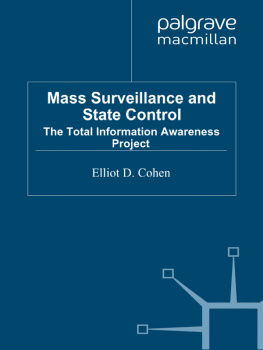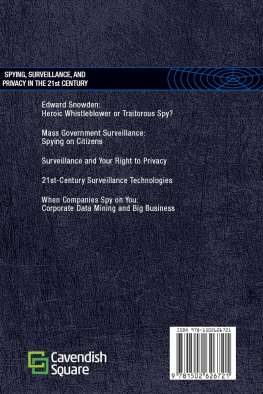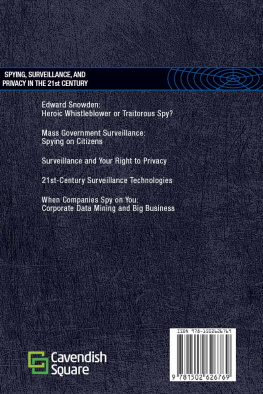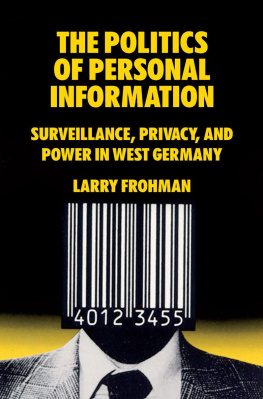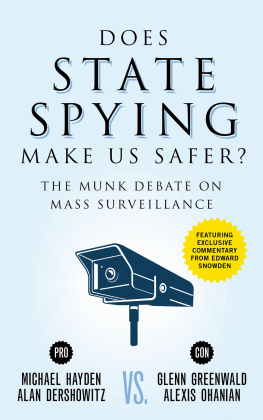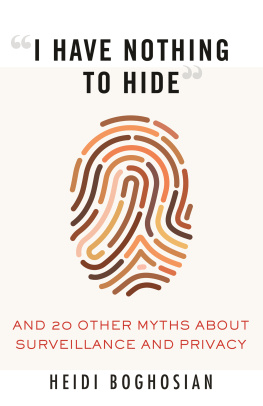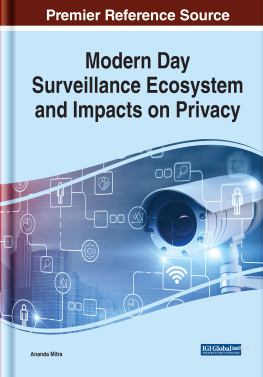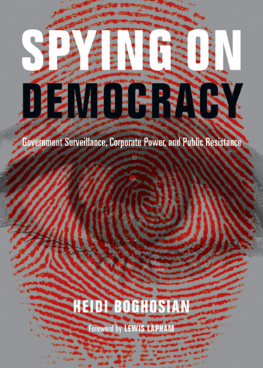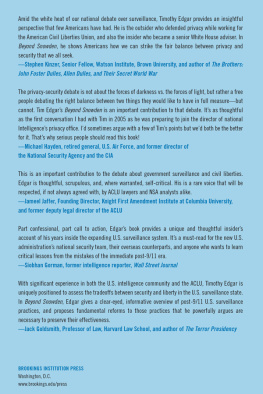Mass Surveillance and State Control
Mass Surveillance and State Control
The Total Information Awareness Project
Elliot D. Cohen


MASS SURVEILLANCE AND STATE CONTROL
Copyright Elliot D. Cohen, 2010.
All rights reserved.
First published in 2010 by
PALGRAVE MACMILLAN
in the United States a division of St. Martins Press LLC,
175 Fifth Avenue, New York, NY 10010.
Where this book is distributed in the UK, Europe and the rest of the world, this is by Palgrave Macmillan, a division of Macmillan Publishers Limited, registered in England, company number 785998, of Houndmills, Basingstoke, Hampshire RG21 6XS.
Palgrave Macmillan is the global academic imprint of the above companies and has companies and representatives throughout the world.
Palgrave and Macmillan are registered trademarks in the United States, the United Kingdom, Europe and other countries.
ISBN: 9780230103047
Library of Congress Cataloging-in-Publication Data
Cohen, Elliot D.
Mass surveillance and state control : the total information awareness project / Elliot D. Cohen.
p. cm.
Includes bibliographical references.
ISBN 9780230103047 (alk. paper)
1. Privacy, Right ofUnited States. 2. Electronic surveillanceSocial aspectsUnited States. 3. Social controlUnited States. I. Title.
JC596.2.U5C64 2010
323.44820973dc22
2010013239
A catalogue record of the book is available from the British Library.
Design by MPS Limited, A Macmillan Company
First edition: October 2010
10 9 8 7 6 5 4 3 2 1
Printed in the United States of America.
Introduction
Warrantless Mass Surveillance in a Culture of Control
In George Orwells famous novel, 1984, Big Brother kept 24/7 surveillance on all citizens of Oceana via a telescreen installed in every home, while the Ministry of Truth streamed in news and entertainment it deemed suitable for popular consumption. Should citizens harbor heretical thoughts, there was also always the Thought Police who, in the dark of night, would visit their homes in order to vaporize them, which included wiping out all traces of their past existence. The Ministry of Love was in charge of law and order, even though there were no longer any laws. And there was the ultimate enemy of state, Emmanuel Goldstein, whose diatribes against Big Brother were regularly broadcast, uniting citizens in hate and fear and in solidarity with Big Brother against this common enemy.
A Culture of Control
In 1984, the tripartite slogan of The Party is, WAR IS PEACE; FREEDOM IS SLAVERY; IGNORANCE IS STRENGTH. These three ideological perspectives characterize what in this book is called a culture of control. Such cultures are characterized by an unequal power structure where one individual or group dominates another; hence, power flows in only one direction. Examples of such a culture can be found in civilizations based on religious extremism. In such cultures, the enemy is the infidel who must be defeated or killed. Questioning ones faith or otherwise straying from it may even be punishable by death. Ones allegiance must be to God (and hence to those who are His ministers). In such a culture, freedom consists in surrendering ones earthly possessions (often to a religious leader), thereby escaping the bondage of the flesh and of the material world, which is viewed as the source of all evil.
In the political sphere, despotic, fascistic states exemplify the idea of a culture of control. The Third Reich is a good example. Power was unilateral, war was waged against a common enemy in the name of national security; and all citizens were expected to have their views aligned with those of the Nazi party. Knowledge flowed only in one direction. The Nazis sought to know everything possible about those subject to their rule. They spied on everyone, including themselves. They wanted to know who were homosexual, Jewish, Gypsy, and who did not have allegiance to the Nazi party. On the other hand, citizens of the Third Reich were expected to believe the propaganda and lies that were disseminated by the Nazi government.
A Culture of Autonomy
In contrast to a culture of control is a culture of autonomy. Such a culture permits power to flow bilaterally. Questioning authority is viewed as a healthy way to resolve differences in living a satisfactory life in common. Diplomacy and friendship are to be favored over attempting to destroy or ostracize those who are not ideologically aligned. In contrast to a culture of control, a culture of autonomy thrives on the mutual exchange of information. There is also transparency between the governor and the governed, and communication flows freely both ways. This kind of culture is identified with the democratic state. It is the idea of a culture that is enshrined in the Declaration of Independence according to which a government derives its power from the consent of the governed for purposes of ensuring unalienable rights to life, liberty, and the pursuit of happiness.
Both cultures of control and autonomy are ideals that are never completely realized. In the real world, a culture of autonomy may resemble, to some extent, a culture of control. Thus, no government is entirely transparent; nor is it entirely open to the views of those who oppose it. Nevertheless, some cultures have moved far enough in one direction or another so as to be appropriately called a culture of control or one of autonomy.
What sort of culture presently exists in America?
America as a Culture of Control
In the past decade, since the 9/11 attacks, America has largely moved in the direction of a culture of control. The tripartite characteristics of such a culture are reflected in the conventional wisdom that winning the war on terrorism is the route to peace; freedom is not free and, therefore, requires sacrifice, such as giving up civil liberties for the sake of safety (including relinquishing our right to privacy); and questioning authority, especially when it comes to national security, is unpatriotic and even treasonous.
Not unlike Orwells Oceana, we are presently a nation under surveillance, a nation whose corporate mainstream media is largely under the influence of the government. While we do not yet have thought police (we do not yet have the technological means), we have indeed been known to disappear citizens deemed to be national security threats. Since the inception of the Bush administration in 2000, the rule of law has been severely compromised by the passage of laws enacted in the interest of national security, that contravene the Bill of Rights of the United States Constitution. This legislation includes laws that permit mass warrantless spying on Americans electronic communications without adequate judicial oversight. In this climate of fear, we have become a nation in the midst of an all out war on terror, not against Emmanuel Goldstein, the dreaded Jew, but this time against Arabs, whose associations and/or ideological ties with al Qaeda or other terrorist groups must never be put past suspicion. Indeed, as discussed in , new FBI laws now permit the FBI to engage in racial profiling in order to hunt for terrorists!
This brief characterization of America today is not a ruse. It is not an exaggeration. Nor is it another slippery-slope argument that lacks empirical evidence. It is a reality.
Next page
